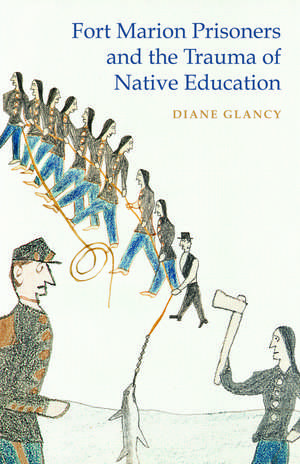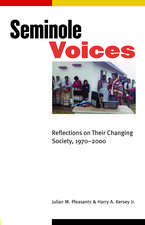Fort Marion Prisoners and the Trauma of Native Education
Autor Diane Glancyen Limba Engleză Paperback – noi 2014
Resurrecting the voices and experiences of the prisoners who underwent a painful regimen of assimilation, Diane Glancy’s work is part history, part documentation of personal accounts, and a search for imaginative openings into the lives of the prisoners who left few of their own records other than carvings in their cellblocks and the famous ledger books. They learned English, mathematics, geography, civics, and penmanship with the knowledge that acquiring the same education as those in the U.S. government would be their best tool for petitioning for freedom. Glancy reveals stories of survival and an intimate understanding of the Fort Marion prisoners’ predicament.
Preț: 173.31 lei
Nou
Puncte Express: 260
Preț estimativ în valută:
33.16€ • 34.62$ • 27.45£
33.16€ • 34.62$ • 27.45£
Carte tipărită la comandă
Livrare economică 05-19 aprilie
Preluare comenzi: 021 569.72.76
Specificații
ISBN-13: 9780803249677
ISBN-10: 0803249675
Pagini: 136
Ilustrații: 3 photographs, 9 illustrations
Dimensiuni: 140 x 216 x 12 mm
Greutate: 0.17 kg
Editura: Nebraska
Colecția University of Nebraska Press
Locul publicării:United States
ISBN-10: 0803249675
Pagini: 136
Ilustrații: 3 photographs, 9 illustrations
Dimensiuni: 140 x 216 x 12 mm
Greutate: 0.17 kg
Editura: Nebraska
Colecția University of Nebraska Press
Locul publicării:United States
Notă biografică
Diane Glancy is an emerita professor of English at Macalester College and is currently a professor at Azusa Pacific University in California. She is the author of numerous novels, including Claiming Breath (Nebraska, 1992), Designs of the Night Sky (Nebraska, 2002), and The Reason for Crows: A Story of Kateri Tekakwitha.
Cuprins
Ledger Book Drawing: The Catch, Bear’s Heart
Fort Marion Prisoners
Photograph of Fort Marion Prisoners
Ride to Prison
The Train Ride
Ledger Book Drawing: Buffalo Hunt, Bear’s Heart
The Animal Show
The Morning Had a Bugle in Its Mouth
Night
Digging a Hole in the Water
Ledger Book Drawing: Boarding the Steam Boat, Bear’s Heart
Backtrack
Ledger Book Drawing: Chart of Goods for Sale, Buffalo Meat
The Ax in my Hand
Ledger Book Drawing: Military Formation at Fort Marion, Bear’s Heart
Fort Marion
Ledger Book Drawings (1)
The Life Casts
Photograph of Life Casts
The Process of Writing (1)
The Ocean Dogs
Ledger Book Drawings (2)
Ledger Book Drawing: Bishop Whipple in his Shark Suit, Bear’s Heart
Schooling
Ledger Book Drawing: The Schoolroom, Bear’s Heart
A Snapshot of the History of Native Education
The Testimonials (1)
The Process of Writing (2)
Pow Wow at the Seaside
The Escape
Ledger Book Drawing: Trees with Hair Standing Up, Bear’s Heart
Trying to Walk while Holding Marbles on a Board
I Was Herded into School with a Big Chief Tablet under My Arm
There Were Clouds
The Testimonials (2)
The Letters (1)
The Weight of Fire
The Process of Writing (3)
I Will Send My Choice Leopards
Letters for Release
Ride from Prison on a Painted Horse
The Argument
Captain Pratt to the Commissioners
The Process of Writing (4)
An Educational Experience
Ledger Book Drawing: Crossing Eads Bridge, Bear’s Heart
Undermath
Photograph of Former Fort Marion Prisoners at Hampton Institute
Acknowledgments
Bibliography
Recenzii
"Glancy is not only an insightful historian but a gifted storyteller. The craft, creativity, and imagination with which she renders this amazing text powerfully draw the reader into the world of the Fort Marion prisoners. Few texts to date have portrayed their experiences with the upheavals of a changing world with such intimacy and humanism."—Steven Williams, American Studies
"A memorable book. Intuitively and perceptively connecting the difficult journeys of late nineteenth-century Southern Plains Indians and her own difficult journeys more than one hundred years later, Glancy gives us valuable, evocative ways of imagining the Great Plains and its peoples in motion, undertaking often painful and traumatic journeys to understand who they are, where they have been, and where they might be going."—Eric Gary Anderson, Great Plains Quarterly
“Diane Glancy inhabits a world of images that breathe life and voice for the voiceless men, women, and children. . . . No simple history lesson, this, as Glancy examines how language is both captor and savior, another means of imprisonment and also liberation.”—Gina Ochsner, author of The Necessary Grace to Fall
“This book is mesmerizing and will stay with you for lifetimes.”—Jackie Old Coyote, Apsaalooke Nation, former director of education and outreach at the Harvard Project on American Indian Economic Development
“The survival of Indian people represents one of the most important subjects in American history. Glancy creates a multilayered narrative about the Kiowa, Cheyenne, Comanche, and Arapaho Indians, who became prisoners of the United States government during the late nineteenth century. She invites readers to contemplate the bleak realities and the difficult choices presented by historical circumstances.”—Brad Lookingbill, professor of history at Columbia College of Missouri






